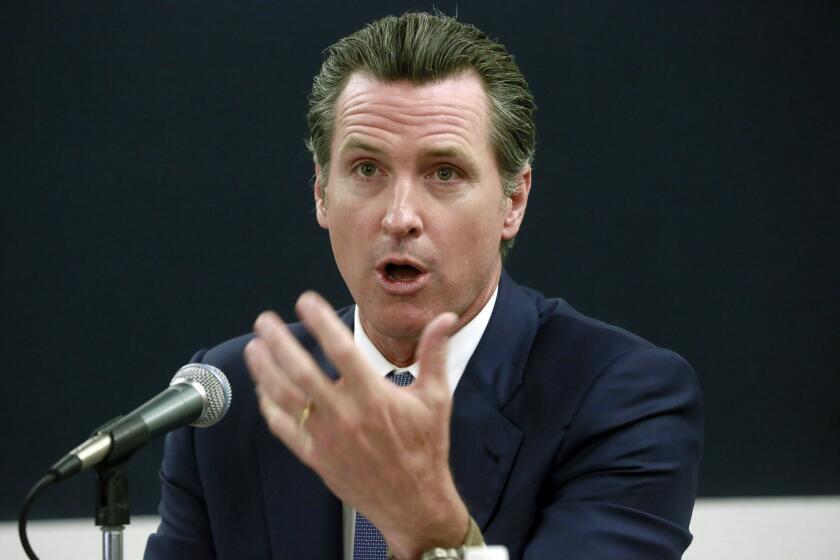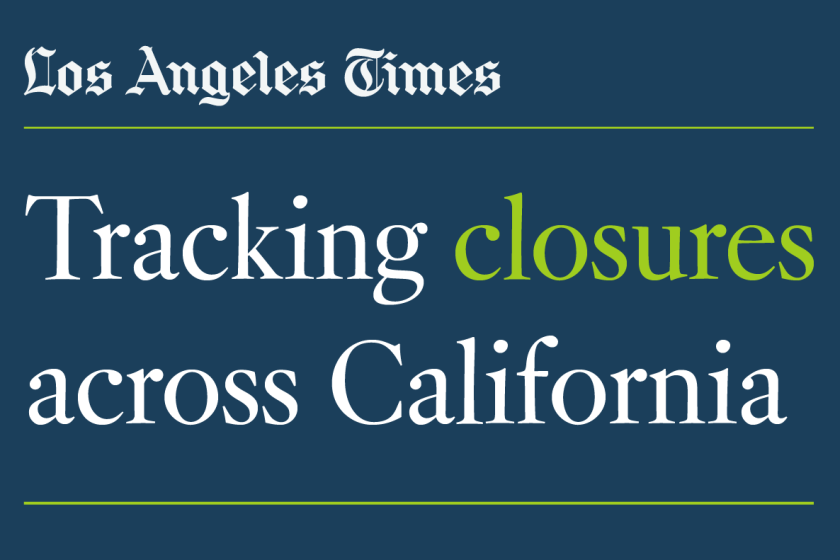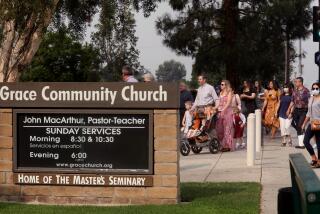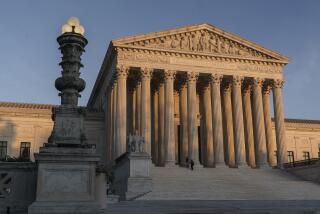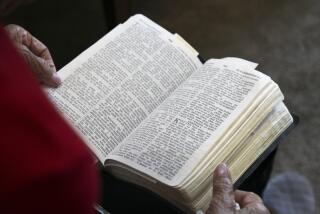Inside the Trump fight with California over opening churches amid coronavirus
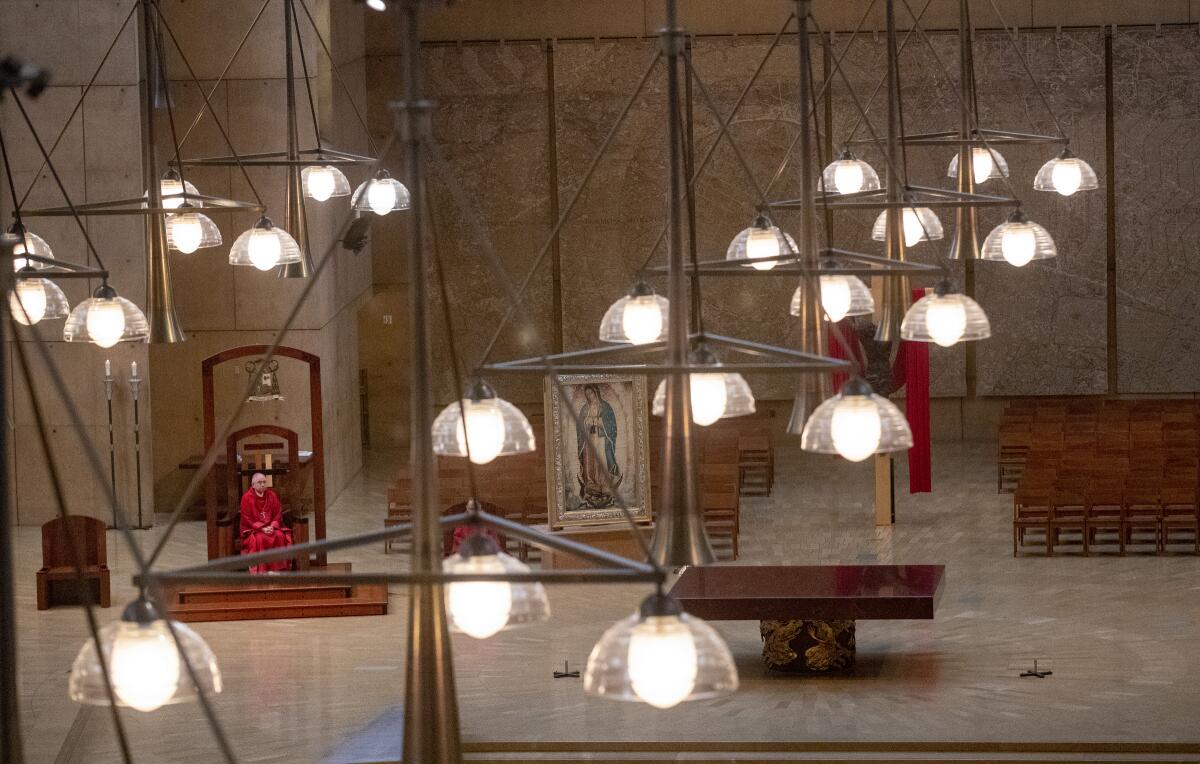
- Share via
California’s stay-at-home order, which is credited with slowing the spread of the coronavirus, has upended the economy and changed the lives of millions. But it has also caused special pain for people of faith, who no longer can worship in person as churches and other religious institutions have been closed.
The religious aspect of the shutdown has been much debated, though the vast majority of houses of worship have gladly complied with the rules to keep their members safe. Still, some churches have filed lawsuits, and a few have defied the order.
But now, the issue has become a point of dispute between the Trump administration and California.
The Justice Department warned in a letter Tuesday that the measures California Gov. Gavin Newsom enacted to slow the spread of the coronavirus and his plans to unwind them might discriminate against religious groups and violate their constitutional rights.
In a letter to the governor, the Justice Department said state coronavirus rules led to the “unequal treatment of faith communities.”
What is the Justice Department’s complaint?
Eric S. Dreiband, an assistant attorney general and the head of the Justice Department’s civil rights division, said Newsom had shown “unequal treatment of faith communities” in restricting their ability to gather and ultimately reopen.
“Simply put, there is no pandemic exception to the U.S. Constitution and its Bill of Rights,” Dreiband wrote.
Dreiband raised issues both with California’s stay-at-home order and Newsom’s plan to roll it back. Although worshipers cannot gather in person, even while following social distancing protocols, California deemed employees in the entertainment and e-commerce industries essential and allowed them to continue working in person, “regardless of whether the product they are selling and shipping are life-preserving products or not,” Dreiband said.
Moreover, Dreiband wrote, the governor has permitted restaurants, shopping malls and offices to resume operations in the second phase of his plan to reopen California’s economy, but houses of worship cannot hold in-person services until its third phase.
“The Constitution calls for California to do more to accommodate religious worship,” Dreiband said, “including in Stage 2 of the reopening plan.”
A livestreamed Mother’s Day church service is being blamed for three coronavirus cases in Mendocino and Lake counties.
How have the courts ruled?
Newsom has been victorious so far in the few legal challenges to stay-at-home rules governing churches.
Several churches and parishioners have asked federal judges to keep Newsom from enforcing the restrictions on worship. None have been successful so far.
The South Bay United Pentecostal Church sued Newsom and other state and county officials over the orders and Newsom’s plan to put churches in Stage 3 of his reopening plans for the state.
Wendy Gish, a parishioner at the Shield of Faith Family Church in Fontana, asked a judge in Los Angeles to strike down the prohibition. “My sincerely held religious belief is that God commands me, and other believers, to regularly come together to worship him,” Gish said in a declaration.
U.S. District Judge Jesus G. Bernal ruled against her.
“An in-person religious gathering is not analogous to picking up groceries, food or medicine, where people enter a building quickly, do not engage directly with others except at points of sale, and leave once the task is complete,” he wrote. “Instead, it is more analogous to attending school or a concert — activities where people sit together in an enclosed space to share a communal experience.”
In Sacramento, a federal judge denied a similar request from Cross Culture Christian Center, a church in Lodi.
“Even in times of health, government officials must often strike the delicate balance between ensuring public safety and preserving the Constitution’s fundamental guarantees,” U.S. District Judge John A. Mendez wrote. “But during public health crises, new considerations come to bear, and government officials must ask whether even fundamental rights must give way to a deeper need to control the spread of infectious disease and protect the lives of society’s most vulnerable.”
On Friday, a federal judge in San Diego denied a request from a Chula Vista church for a temporary restraining order against the state that would allow it to hold in-person services.
U.S. District Judge Cynthia Bashant said the orders did not discriminate against religion and were a legal use of state authority in the time of a health emergency.
To contain the spread of COVID-19, parks, restaurants and stores are slowly reopening.
What has the state said?
Newsom’s office didn’t immediately respond to the Justice Department letter.
On Monday, the governor loosened rules linking coronavirus infection rates to permitted activities — a change that could release most parts of the state from the tightest restrictions of his stay-at-home order.
The rules will allow restaurant dining rooms and shopping malls to open again in counties that meet the new criteria. Newsom also hinted that even bigger changes envisioned in later stages of reopening were just around the corner, such as the opening of hair salons and even spectator-free sporting events as soon as the first week in June.
Businesses considered high-risk such as hair and nail salons, gyms and movie theaters, along with churches and religious institutions, fall under Phase 3 of the reopening plan.
Earlier this month, Newsom said those reopenings could occur as soon as it is safe.
“Phase 3 is not a year away. It’s not six months away. It’s not even three months away. It may not even be more than a month away. We just want to make sure that we have a protocol in place to secure customer safety, employee safety and allow the businesses to thrive in a way that is sustainable,” Newsom said.
As Angelenos practice social distancing to slow the spread of coronavirus, many houses of worship have moved their faith communities online.
What have churches been doing?
Some have streamed religious services. Others have tried drive-in church events.
Many have urged parishioners to stay home and stay safe.
But a few have held services.
Public health officials in Butte County issued a strongly worded warning after a person who attended an in-person religious service on Mother’s Day tested positive for the coronavirus. That organization held the service despite county rules, exposing the entire congregation to the virus, officials said.
The person received a positive test result the day after the service, which had more than 180 attendees. Officials were working to notify all those who had attended and obtain testing for them.
The pastor, Mike Jacobsen of Palermo Bible Family Church, spoke out on social media about his decision to hold the service, saying he would “never with knowledge put anyone in harms way.”
“For 7 weeks we have been kept out of our church and away from our church family,” Jacobsen wrote in the post, which has since been deleted. “I am fully aware that some people may not understand that for our church it is essential to be together in fellowship.”
Meanwhile, a Mother’s Day church service in Northern California is being blamed for a cluster of coronavirus cases in Mendocino and Lake counties.
Mendocino County health orders permit churches to produce events that are livestreamed or recorded, provided certain precautions are taken.
The service was livestreamed, but three people who became infected physically attended the May 10 church service in inland Mendocino County, which involved singing, and two of them participated, county officials said in a news release. Officials did not name the house of worship but said they were urging church leaders to do so themselves to encourage congregants who were present to seek testing.
In San Diego County, at least two churches, in Chula Vista and Oceanside, held religious services in person Sunday despite orders.
More to Read
Sign up for Essential California
The most important California stories and recommendations in your inbox every morning.
You may occasionally receive promotional content from the Los Angeles Times.
